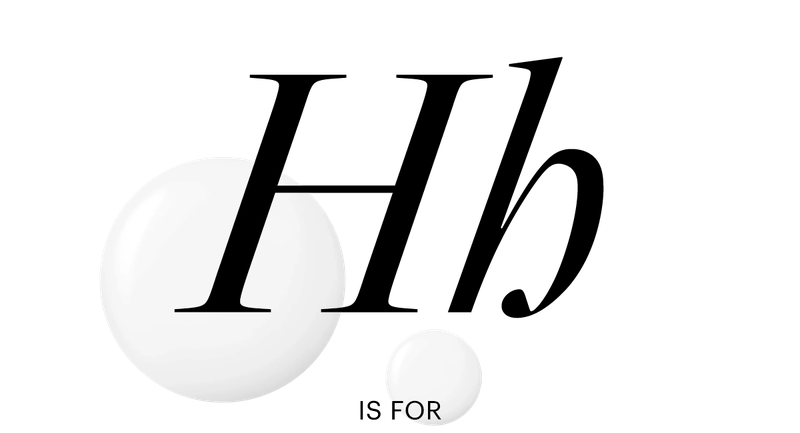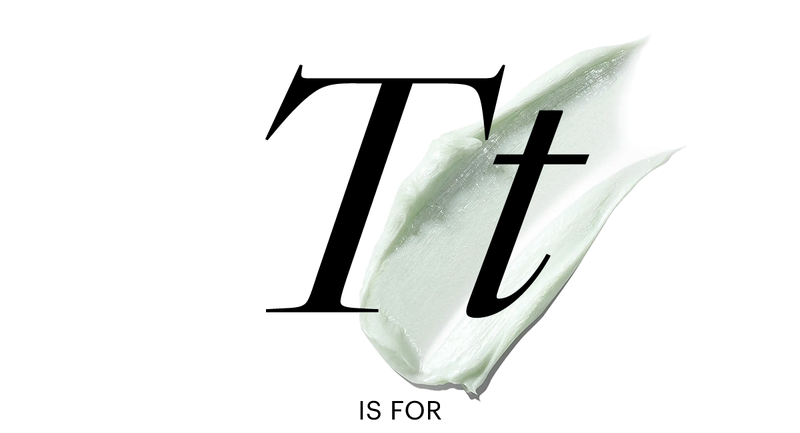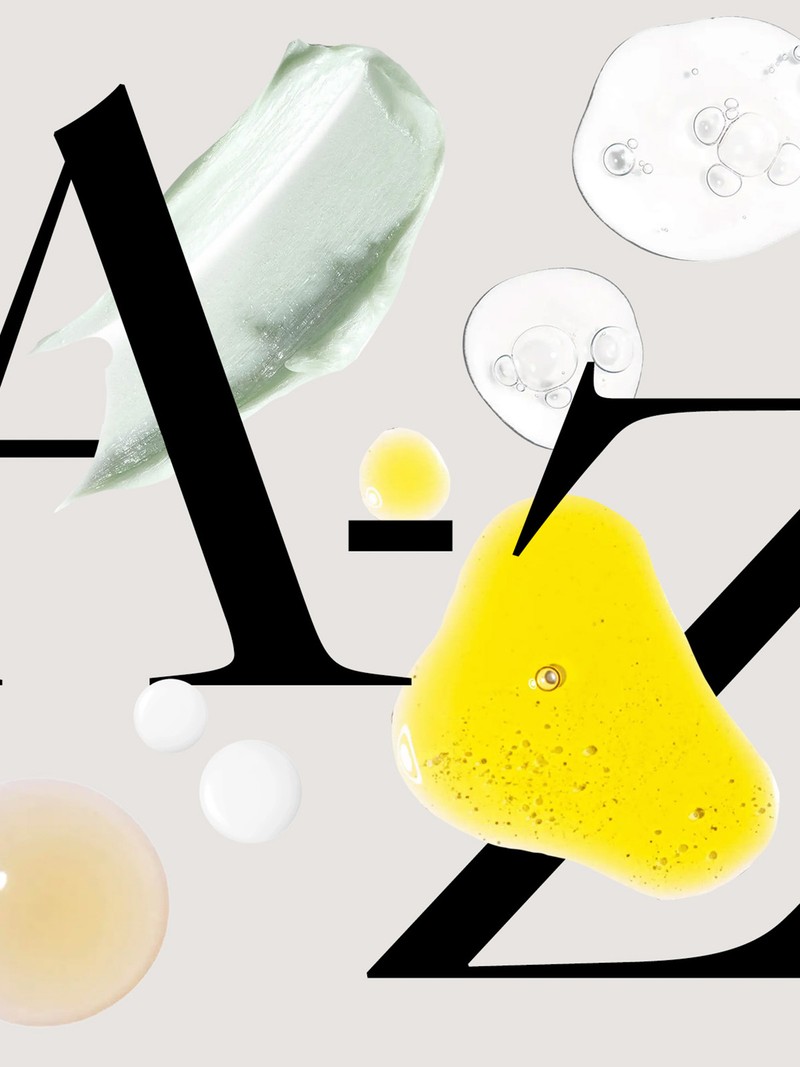The Ultimate A-Z Glossary Of Beauty Terminology

AI Beauty
AI is set to accelerate product development and revolutionise customisation in the beauty world this year. How? Brands using increasingly sophisticated tech to help capture things like your skin tone can calculate exact shade matches for foundations and concealers – Dcypher is a name to know for this. You can also expect brands to use the term ‘AI Beauty’ for virtual make-up and hairstyle try-ons. Case in point: Maybelline will launch its Virtual Beauty Studio to help you make informed purchases based on AR-generated looks. The idea is it helps you experiment and play, without all the usual waste of sampling.

Biotech
Polynucleotides and exosomes – just two players in skincare's push towards a future dominated by biotech. Experts say the beauty industry is now witnessing a convergence of longevity science and cutting-edge anti-ageing methods, birthing a new generation of products that go beyond mere surface-level wrinkle reduction. Upcoming creams and serums for 2024 will be full of biochemical formulations that aid the anti-ageing process. Keep an eye out for Invity's imminent releases, including the game-changing Youth Activating Overnight Mask. Other brands making waves in this space include Orveda, set to debut its facials at Harrods next month, and Fjor, a Swedish brand teaming up with a biotech lab to tap into the power of hydrolytic enzymes.

Ceramides
Making up over 50% of our skin’s composition, ceramides are fat cells that form a protective barrier, keeping our skin plump and feeling hydrated. Essentially, they are the secret to keeping your complexion healthy and youthful, but our natural levels deplete from the age of 20, with a loss of 1% annually. The good news is there is a host of topical remedies that are continuing to launch and put the focus on this key ingredient. Look out for them in CeraVe’s new Advanced Repair Ointment and Kiehl’s Ultra Facial Barrier Balm. Regular use will help to rehydrate thirsty skin, provide instant relief to dryness and keep your complexion supple.

Dermatologically Tested
This is a term which often sparks confusion, but simply means the product has been reviewed by a dermatologist – someone who specialises in treating the skin, hair and/or nails – and is more often than not approved by them for its efficacy and use on all skin types.

Ectoin
Ectoin was discovered in 1985 but has only become popular recently. It’s known as an ‘extremolyte’, something taken from extremophilic microorganisms. In simple terms, extremolytes are able to protect cellular integrity within plants in extreme weather conditions – including droughts and harsh temperatures. They do this by forming a protective and hydrating shield around them, and it’s these key benefits that experts realised could be achieved within skincare formulas. Not only can ectoin protect skin cells from chemical and physical damage, it can protect against the damaging impacts of stress and inflammation on your skin. Expect to see this key ingredient pop up everywhere this year – look out for in both Dr. Jart's Ceramidin Ectoin-Infused Cream and Niod's Modulating Glucosides Serum.

Fermented Blends
Fermented skin and beauty formulas are going to be big this year. The idea is that the process of fermentation helps to break down ingredients into smaller, more concentrated molecules, meaning better product penetration and maximum potency. You’ll likely find fermented ingredients in essences and serums – both of which are thinner in texture for maximum impact. We recommend the SK-II Facial Treatment Essence, but also Drunk Elephant’s new Sweet Biome Fermented Sake Spray which is brilliant for soothing and alleviating discomfort.

Growth Factors
Growth factors are large proteins that are vital to healing and survival, and now they’re being used in skincare to help repair and rejuvenate, with dermatologists also starting to promote their efficacy. As we age, our skin produces smaller quantities of our own growth factors, so using them topically is one way to promote softer, plumper skin. They’re also proven to fight off damage from pollution and boost elastic fibres, so look out for them in serums and face creams.

Hypochlorous Acid
Set to be big in skincare formulations this year, hypochlorous acid (HA) is harsh on harmful bacteria, but gentle on skin – even those prone to sensitivities. We’re starting to see it creep into more formulations with experts claiming it helps fight common bacterial skin issues, including acne, eczema and psoriasis. It works hard to reduce inflammation and speed up your skin’s natural healing processes. The best bit? It doesn’t need to be introduced slowly like other potent ingredients – as your skin naturally produces its own levels of HA, you can never ‘overdo’ it. We’ve found it works well in Tower 28’s SOS Intensive Redness Relief Serum, taking down inflammation at speed.

Intense Pulsed Light (IPL)
IPL is a popular machine-based treatment using different wavelengths of light. This is what makes it different to laser treatment, which uses just one beam of light. It works to remove hair, erase acne and scarring, pigmentation, spider veins and so much more. It’s also gentler and more affordable than laser. Just look for a reputable provider who specialises in IPL so you can be sure you’re in safe hands.

Japanese Indigo
Several skin experts recommend looking out for this ingredient in 2023 – A-list facialist Jasmina Vico swears by it. Known for its healing benefits, it’s good for those looking to minimise inflammation from conditions including eczema and rosacea. You’ll find it crops up in everything from masks to serums and creams – we love the Tatcha Indigo Overnight Repair Cream, which harnesses the powerful ingredient to minimise irritation, redness and sensitivity.

Kojic Acid
Speaking of Japan, kojic acid is another key ingredient found in J-beauty products. Known as a skin lightener, it’s also proven to prevent melanin, the appearance of dark spots and post-acne scarring. Because it penetrates the skin deeply, stick to small concentrations and percentages – high amounts can cause additional sensitivity.

Linoleic Acid (Vitamin F)
Known for its skin barrier-strengthening benefits, linoleic acid (vitamin F) is an essential fatty acid found in rosehip, sunflower, olive and flaxseed oils. It helps to keep the skin’s lipid barrier strong, and complexions healthy looking and even in tone. It’s also been proven to take down inflammation, and keep eczema and sensitivity at bay – in fact, studies show those who suffer from acne have low levels of linoleic, so it’s worth stocking up if you’re plagued by breakouts.

Mesotherapy
Mesotherapy is a treatment that involves teeny-tiny injections of popular ingredients to promote collagen and elastin, while boosting your cell metabolism. The result is better skin texture and less pigmentation over time. Typically, a mesotherapy ‘cocktail’ will contain over 40 active ingredients – think vitamins A, B, C, E and K – to work your skin hard and tackle individual concerns. It’s not a new treatment, having been around since the 90s, but it’s gaining traction due to its speedy appeal. A treatment can take as little as 15 minutes and, thanks to numbing cream, the procedure is relatively painless with no downtime. Said to reboot your skin from the inside out, it’s best suited to those seeking better glow and overall tone, but is also useful for reducing acne scarring.

NanoFirm
You’ll be hearing lots about NanoFirm this year. It’s a new treatment hailing from South Korea that works on both sunspots and pigmentation. Combining laser, ultrasound and something called galvanic energy, it stimulates skin cells to produce more collagen and elastin, improving skin tone and texture for fewer visible wrinkles and other early signs of ageing. It sounds intense, but the benefit is it’s quick – all you need is an hour with minimal downtime. Interested? Dr David Jack is one of the first to offer it at his clinic.

Omegas
It’s easy enough to ingest our omegas through regular portions of salmon, walnuts and olive oil, but our skin can benefit too. Omega-3 fatty acids supply the skin with essential nutrients, as well as help it dispose of toxins and retain more water in the epidermis, which results in a smoother and stronger complexion.

Peptides
Experts recommend thinking of peptides like building blocks that make up your skin’s structural proteins – including collagen and elastin. Without them, your skin wouldn’t remain intact, resulting in a duller, slacker-looking complexion. As we age, our skin contains fewer peptides, which is why our complexion can look less springy. Using them topically may not reverse the clock entirely, but it will up your skin’s hydration and keratin levels for a smoother, plumper-looking complexion.

Quercetin
With both antioxidant and anti-inflammatory properties, quercetin is a skincare ingredient that neutralises free radicals (the main cause of ageing), as well as protecting skin from damaging sun rays. Expect to hear a lot more about it this year – including several product launches hailing its capabilities.

Retinol/Retinoid
‘Retinoid’ is the catch-all term used to describe all vitamin A derivatives found in your beauty products. Retinol, also known as vitamin A, works to promote skin renewal and enhance collagen production (which starts to decline in your 30s). As well as blurring fine lines and softening wrinkles, it can also reverse UV damage – but be cautious, retinol is one of the most potent ingredients out there, so opt for a low percentage, especially if your skin is on the sensitive side. Try 0.3% for minimal irritation, as this will still have a significant impact on your skin.

Skin Streaming
‘Skin streaming’ is short hand for streamlining your routine, whittling it down to only the essentials and no unnecessary steps. The benefit is maximum efficacy from less money spent. The idea is your routine consists of the following: a gentle cleanser, a moisturiser, a hydrator and an SPF. Any additions in between these steps come down to your individual needs – for instance, a vitamin C serum in between cleansing and moisturising to boost collagen production and brighten skin.

Tansy
Blue tansy is another ingredient to watch out for in 2024. An essential oil, it has anti-inflammatory, calming properties and has even been used by oncologists to treat patients suffering from skin burns and irritation after radiation treatments. Experts rate it for breakouts too, thanks to its ability to help with congestion and severe redness. Expect to see it in lots of skin treatments in the coming year – specifically in serums where you will get a more concentrated dose.

Ultrasonic HIFU
Trending on social media – notably TikTok with over 275 million views – HIFU (high-Intensity focused ultrasound) is the latest treatment to note. Promising to contour and tighten skin, it uses a combination of radiofrequency via micro-needling, meaning it can target the deepest layers of your skin, causing contractions that lift and firm your skin. This is all done without causing damage to other areas of skin. Referred to as the ‘gold standard’ for anti-ageing, it offers impressive results and is known for its minimal downtime. You can have it done within an hour and can expect to see results within 12 weeks – this is the time it takes for collagen to rebuild. As with any treatment, always book a consultation first to ensure you’re eligible.

Vitamin B3 (Niacinamide)
Vitamin B3 is able to interact with several different skin cell types, which is what makes it so effective. Regular use helps builds proteins to protect skin against environmental damage – think UV and the dulling effects of pollution. Vitamin B3 is also known to increase your skin’s keratin levels for suppler, smoother texture.

Water-Free
When you look at the ingredient list on any beauty product, chances are ‘aqua’ – or water – will be at the top. However, as conscious beauty becomes a bigger trend, more brands are formulating products with little or no water to improve their environmental credentials. This year, expect to see more water-free products hitting the shelves. The best bit? Botanicals and oils are used as replacements, which are not only more potent, but aid in producing plumper, smoother skin.

Zinc Oxide
In its most natural state, zinc oxide is a white, powdery mineral and one of the key ingredients in SPF. Zinc-based formulas are often compared unfavourably to chemical SPF formulas as zinc has a reputation for being chalky, however it’s worth making the switch if you can. Not only are these formulas lighter in texture, they create a protective barrier and deflect UV rays more effectively – they’re also proven to minimise acne and breakouts, with dermatologists regularly highlighting their anti-inflammatory benefits.
DISCLAIMER: We endeavour to always credit the correct original source of every image we use. If you think a credit may be incorrect, please contact us at info@sheerluxe.com.


